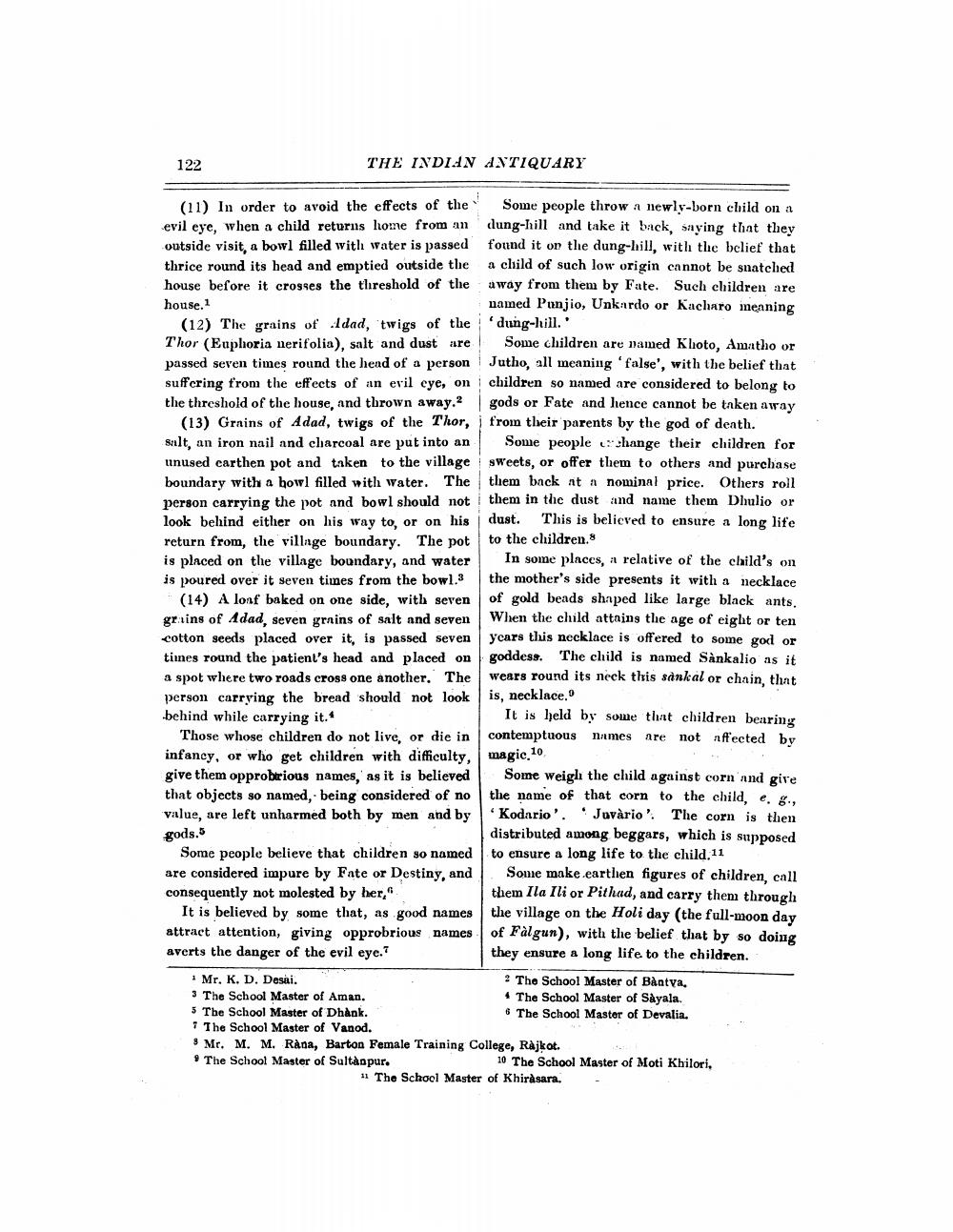________________
122
THE INDIAN ANTIQUARY
(11) In order to avoid the effects of the Some people throw a newly-born child on a evil eye, when a child returns home from an dung-hill and take it back, saying that they outside visit, a bowl filled with water is passed found it on the dung-hill, with the belief that thrice round its head and emptied outside the a child of such low origin cannot be snatched house before it crosses the threshold of the away from them by Fate. Such children are house.
named Ponjio, Unkardo or Kacharo meaning (12) The grains of Idad, twigs of the 'dung-hill.' Thor (Euphoria nerifolia), salt and dust are some children are named Kloto, Amatho or passed seven times round the head of a person Jutho, all meaning 'false', with the belief that suffering from the effects of an evil eye, on children so named are considered to belong to the threshold of the house, and thrown away.2 gods or Fate and hence cannot be taken away
(13) Grains of Adad, twigs of the Thor, i from their parents by the god of denth. sult, an iron nail and charcoal are put into an Some people change their children for unused carthen pot and taken to the village sweets, or offer them to others and purchase boundary with a bowl filled with water. The them back nt a nominal price. Others roll person carrying the pot and bowl should not them in the dust and name them Dhulio or look behind either on his way to, or on his dust. This is believed to ensure a long life return from, the vilinge boundary. The pot to the children.” is placed on the village boundary, and water In some places, a relative of the child's on is poured over it seven times from the bowl.3 the mother's side presents it with a necklace
(14) A lonf baked on one side, with seven of gold beads shaped like large black ants. grains of Adad, seven grnins of salt and seven When the child attains the age of eight or ten cotton seeds placed over it, is passed seven years this necklace is offered to some god or times round the patient's head and placed on goddess. The child is named Sankalio as it a spot where two roads cross one another. The wears round its neek this sankal or chain, that person carrying the bread should not look is, necklace. behind while carrying it.*
It is held by some that children benring Those whose children do not live, or die in contemptuous names are not affected by infancy, or who get children with difficulty, magic, 10 give them opprobrious names, as it is believed Some weigh the child against corn and give that objects so named, being considered of no the name of that corn to the child, e. , value, are left unharmed both by men and by Kodario'. Juvario' The corn is then gods."
distributed among beggars, which is supposed Some people believe that children so named to ensure a long life to the child.11 are considered impure by Fate or Destiny, and | Some make.earthen figures of children, call consequently not molested by her,"
them Ila Ili or Pithad, and carry them through It is believed by some that, as good names the village on the Holi day (the full-moon day attract attention, giving opprobrious names of Falgun), with the belief that by so doing averts the danger of the evil eye.7
they ensure a long life to the children. * Mr. K. D. Desai.
? The School Master of Baatva. 3 The School Master of Aman.
The School Master of Sayala. 5 The School Master of Dhank.
6 The School Master of Devalia. * The School Master of Vanod. * Mr. M. M. Rana, Barton Female Training College, Rajkot. # The School Master of Sultanpur.
10 The School Master of Moti Khilori, 11 The School Master of Khirasara. -




